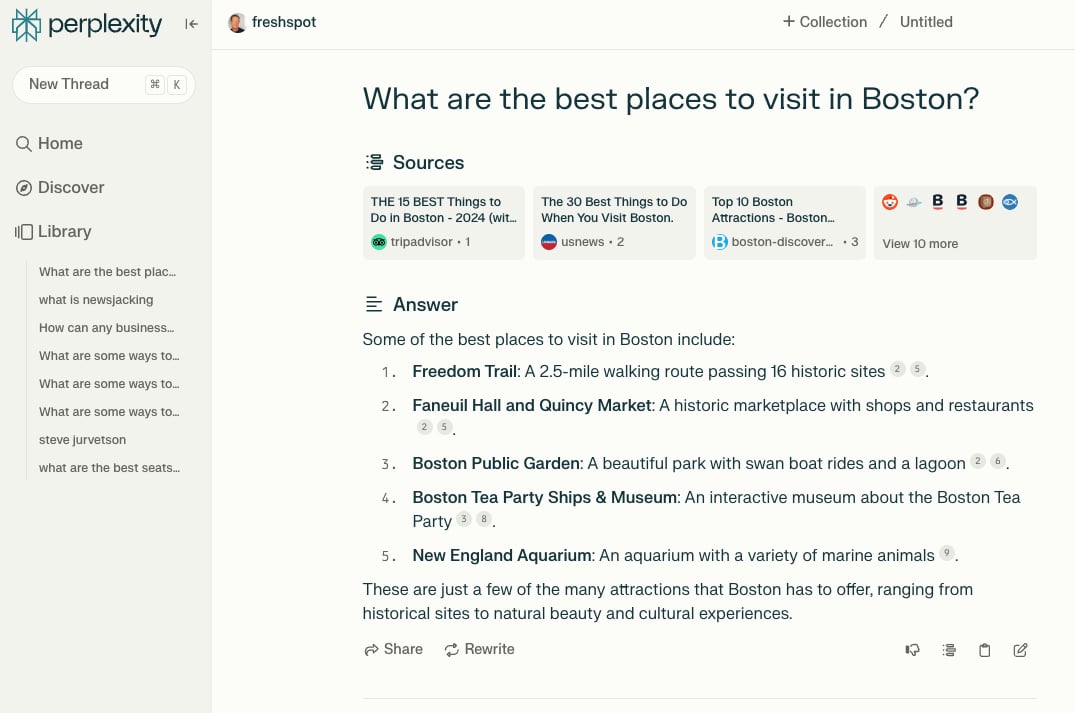For the past few weeks, I have been using Perplexity.ai as my default search engine. It’s a cool hybrid between a chatbot such as ChatGPT and a traditional blue link search engine like Google. The way Perplexity displays answers to natural language queries, showing a text answer together with links for more information, is the future of both chatbots and search.
As we all know, AI chatbots are radically changing the way people use information on the Web. These changes are fundamentally disrupting how brands get found and rendering many Search Engine Marketing strategies obsolete. When you ask a chatbot a question, you don’t simply get the list of blue links we’ve all become accustomed to—and planned our marketing around—for the past two decades. If you’ve used ChatGPT or other AI-powered text chatbots such as Google’s Gemini or Anthropic’s Claude, you’ve seen the new paradigm. These tools provide lengthy, descriptive answers to your natural-language questions. As of this writing, links to the sources that informed those answers aren’t normally provided.
For example, I just ran a simple Google search for the question “What are the best places to visit in Boston?” The top results were links to articles on Tripadvisor, a major travel information site, and U.S. News Travel, a specialized subsite from the publishers of U.S. News & World Report magazine. Because Google’s answer comes in the form of a list of links, I need to visit those sites to access details on the information I’m seeking. However, when I put the same query, “What are the best places to visit in Boston?” to ChatGPT, I’m presented with a numbered list of twenty suggestions of places to visit with a sentence of detail for each. The list includes the Freedom Trail, Fenway Park, and the Boston Common. It does not include links to help me learn more. The tool offers no indication of where these ideas originated.
In short, travel companies’ carefully curated Search Engine Marketing strategies for selling Boston tourism products are in danger of becoming obsolete. The same is true in your industry!
The data for large language models (LLMs) like OpenAI’s ChatGPT come from many publicly available sources, including the public internet, YouTube video descriptions and transcripts, books, and more.
The majority of chatbots don’t currently cite the sources of the data that inform answers. Results usually look like the reply to my Boston sightseeing question. However, there have been several lawsuits challenging AI companies for using published data to train LLMs without permission. The New York Times and numerous individual authors are among the complainants.
Because of these legal challenges, I’m convinced AI companies will begin to modify how they construct and share results. In the future, I expect these companies will have to license training content, rather than simply scraping it from the public Internet for free. That means the sources of an answer will likely be indicated within results in the coming months and years. I also expect we’ll see links to additional content and in-context advertising, like the ads that appear in Google searches. In short, LLM chatbots will start to cite their sources. Nobody really knows if these changes will happen next month or next year or in five years, but now is the time to get started if you want your company to be found and referenced by AI chatbots.
That’s where Perplexity comes in. To get a sense of where things might be heading in this space, the Perplexity search engine is a chatbot interface for search that uses a conversational approach both for queries (your natural-language question) and results (paragraph-based text responses).

The reason I think this new search engine is so interesting is that, unlike a typical chatbot answer from an LLM like ChatGPT, Perplexity answers also include links to the sources used to construct the answer. This hybrid approach answers your question while also allowing you to follow up directly in the sources for additional context. So if you ask for tourist sites in Boston, you’ll get the list as well as the relevant links. I think we should all assume tools like Perplexity offer a glimpse of the future of AI-assisted research.
Understanding how the LLMs work and predicting how the chatbot interfaces will display results gives marketers a strategy to execute now. It’s like I’ve been saying for two decades: Create great content and you will get found!

David Meerman Scott
David Meerman Scott is a business growth strategist, advisor to clever entrepreneurs who are building emerging companies, and the international bestselling author of a dozen books published in 30 languages. David’s high-energy keynote presentations, masterclasses, and virtual events educate, energize, and inspire.










